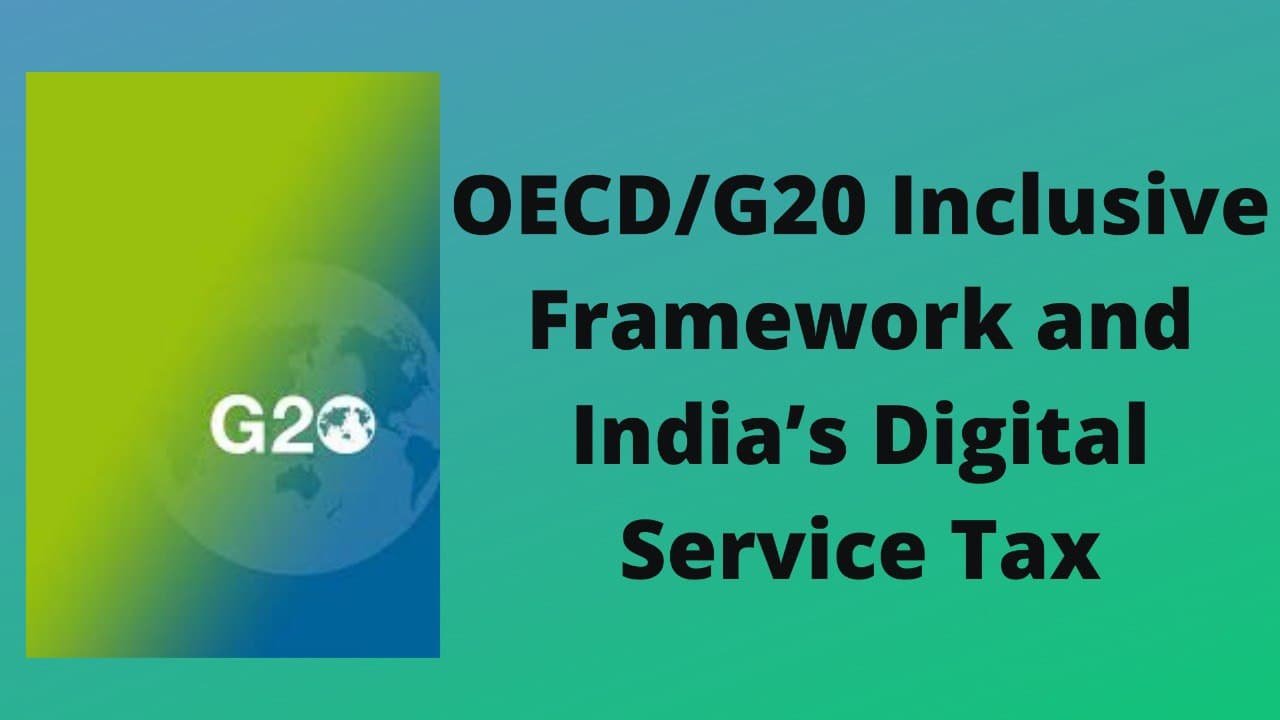OECD/G20 Inclusive Framework and India’s Digital Service Tax
International trade has been profoundly influenced by digitalization. It has connected a larger number of firms and customers worldwide, decreased the costs of international commerce, aided the diffusion of ideas and technology, and made global value chains easier to coordinate (GVCs). Trade has grown in size, scope, and speed as a result of digitalization.

INTRODUCTION
International trade has been profoundly influenced by digitalization. It has connected a larger
number of firms and customers worldwide, decreased the costs of international commerce,
aided the diffusion of ideas and technology, and made global value chains easier to coordinate
(GVCs). Trade has grown in size, scope, and speed as a result of digitalization.
Despite the fact that international commerce has never been easier, the adoption of new models has resulted in more complicated international trade transactions and regulatory challenges.
Because of the digitization of the economy and savvy tax planning, some multinational
corporations (“MNCs”) have been able to avoid paying practically all income tax in most
market jurisdictions where they generate significant profits. Market nations have moved to
broaden their tax bases in response to financial and political demands to act, so that these
MNCs, particularly those offering internet services, digital intermediation services, advertising
and, pay their fair amount of tax. India, the United Kingdom, and Italy are among the nations
that have implemented a Digital Service Tax (“DST”).
The OECD began discussing “the development of the digital economy and its influence on digital taxation” in 2013. This led to the establishment of OECD/G20 Inclusive Framework (“OECD Framework”).
The US has discouraged states from enacting specific country-based DSTs, arguing that unilateral
legislation such as India's DST stymie OECD progress by making a global approach to digital
taxes less probable. Countries lose motivation to participate actively in discussions if unilateral
steps spread while negotiations are continuing.
OECD Framework
In July 2021, 134 nations agreed on the “Framework for a Two-Pillar Solution to the Tax
Challenges Arising from Digitalisation”, which is a significant accomplishment.4 By October,
the framework had left several crucial elements up for discussion. “The amount of residual
profit to be re-allocated to market jurisdictions under Pillar One”, for example, was left open
at first but has since been agreed upon as 25%. “The rate of the minimum tax under Pillar Two”
has now also been decided upon as 15%, although the level was left open in July at ‘at least
15%.’Other thresholds and rates, as well as ways to maintain tax certainty, remained to be
finalised. Furthermore, a thorough implementation strategy has been agreed upon to help
guarantee that the aggressive implementation dates are reached.
The OECD has suggested a two-pillar worldwide taxation deal. MNCs will be liable to a min.
15% tax rate from 2023, according to a major overhaul of the international tax system completed in October at the OECD. The agreement does, however, compel governments to repeal any digital services taxes and other comparable measures, as well as to promise not to enact them in the future. The OECD said, “No newly enacted digital services taxes or other relevant similar measures will be imposed on any company from October 8 and until the earlier of December 31, 2023, or the coming into force of the MLC.”
India and OECD Framework
India may abandon the DST in favour of the OECD framework. Experts say it's not a bad
bargain because India expects to earn far more than it has to give up in terms of digital tax.
Accepting the deal might benefit India in two times, according to India's finance minister.7
The two-pillar programme calls for a halt to unilateral actions like DSTs, as well as the
elimination of them. In the absence of a worldwide solution agreed to by all members, countries
have experimented with these tariffs, but only as a last resort. Members of the Inclusive
Framework recognise that unilateral actions can be not so efficient and lead to problems with
other nations, because they might result in double taxation and trade retaliation. The large
digital corporations were always the main targets of these DSTs, which would now be subject
to the new tax under Pillar One. The members of the Inclusive Framework recognised that “A
coordinated approach is more efficient than a proliferation of unilateral steps”, which would
lead to increased uncertainty for taxpayers and trade wars between countries, by negotiating a
standstill and removal of such measures jointly.
Conclusion
The COVID-19 pandemic has worsened governments' need for revenue all across the world. It
is apparent that the worldwide tax community is concerned about the taxes of the digital
economy. Despite the fact that both the OECD and the UN have issued suggestions, the future
of digital taxes is dependent on political agreements and international consensus. However,
unilateral actions are causing increased political tensions throughout the world. Unilateral
actions have a disproportionately detrimental impact on low-margin, high-investment firms, as
well as the potential for additional costs to be passed on to consumers.
In light of the pandemic, it is hoped that the importance, if not the need, of promoting trade and
economic activity takes precedence over a conflict over tax allocations. The entrenchment of
unilateral levies or tax-related trade tensions is likely to affect national and global economies,
as well as consumers. The OECD framework’s Two Pillars consensus are critical to ensuring
a more predictable and stable tax policy for MNCs and governments. As a result, India may
abandon its DST in the hopes of gaining greater benefits from the framework.












